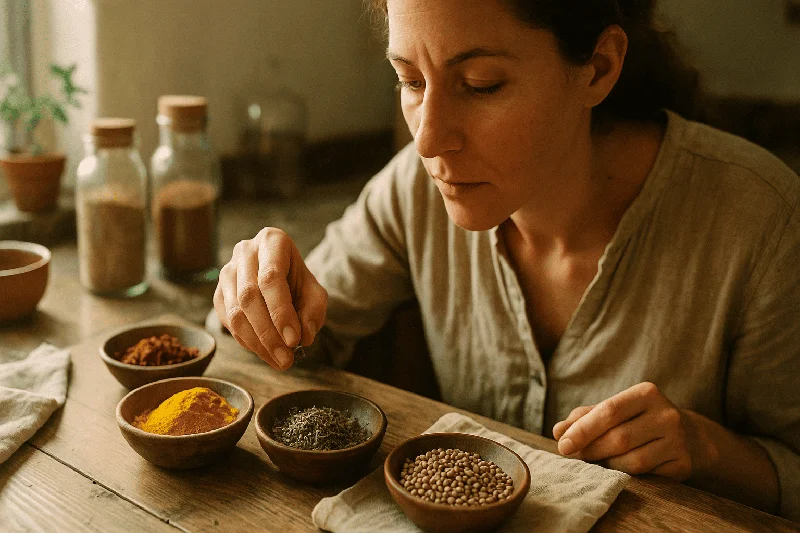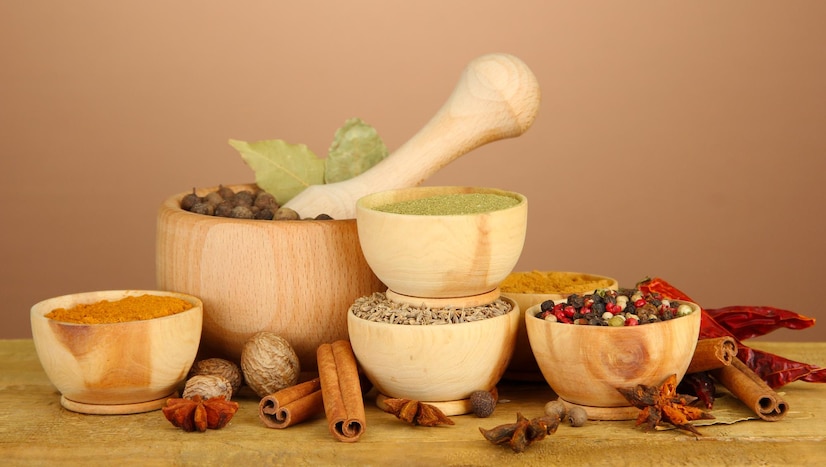Spices: Beyond Just Flavor

Key Takeaways
-
Spices play a vital role in Ayurveda, functioning beyond seasonings to balance energies and promote overall wellness.
- Many spices possess healing properties that have been recognized and utilized for centuries, contributing significantly to health and well-being.
- Incorporating spices into daily diets can offer various health benefits, supporting a wholesome and balanced lifestyle.
- Spices have historical significance in Ayurveda, influencing traditional medicine practices and shaping holistic health approaches.
- The potential of spices extends from enhancing flavors to boosting holistic health, emphasizing their multifaceted benefits.
Imagine a world without the aroma of spices wafting through your kitchen. It's not just about adding flavor; spices hold a deeper significance, especially in Ayurveda. This ancient Indian practice doesn't just see spices as kitchen staples but as powerful tools for health and healing. From turmeric's golden glow to the fiery kick of ginger, each spice has unique benefits that go beyond taste. In this article, we'll explore why spices are more than just flavor enhancers and how they play a crucial role in Ayurveda's holistic approach to health. Whether you're curious about the healing power of spices or their historical roots, there's much to uncover. Let's embark on this flavorful journey together!
Healing Spices: Nature's Remedy
Spices have been used for centuries not just for flavor, but for their healing properties. Did you know that turmeric, a common spice, contains curcumin, which has antioxidant and anti-inflammatory effects? According to a study published in the Journal of Medicinal Food, curcumin can help reduce inflammation in conditions like arthritis. This showcases how spices can go beyond the kitchen and into natural medicine.
Another example is ginger, often recommended for nausea and digestion. A study from the University of Maryland Medical Center found that ginger can effectively reduce symptoms of nausea in pregnancy. These examples illustrate how healing spices can be a natural remedy for common ailments.
Spices in ayurveda often include these healing powers. Ayurveda, an ancient system of medicine, uses spices like cumin and coriander to balance the body. This practice highlights the holistic approach to health, where spices are more than just simple seasonings. They serve as a bridge between culinary art and health science, emphasizing their role in wellness.
Spices for Health: A Daily Boost
Spices have been part of human diets for centuries, adding flavor and color to our meals. But did you know they also offer health benefits? Let's explore how spices can be a daily boost for your well-being.
Antioxidant Power
Many spices are rich in antioxidants. These substances help fight free radicals in the body, reducing the risk of chronic diseases.
- Turmeric: Known for its bright yellow color, turmeric contains curcumin, a powerful antioxidant that also has anti-inflammatory properties.
- Cinnamon: Often used in desserts, cinnamon can help lower blood sugar levels and may reduce the risk of heart disease.
Digestive Aid
Spices can also support digestion. They stimulate the digestive system, making it easier for the body to process food.
- Ginger: This spice is famous for easing nausea and improving digestion. It's often recommended for pregnant women experiencing morning sickness.
- Peppermint: Known for its refreshing taste, peppermint can relieve digestive issues like bloating and gas.
Immune System Support
Some spices are known to strengthen the immune system, helping the body fight off infections.
- Garlic: With its strong aroma, garlic has been used as a natural remedy for centuries. It contains compounds that may boost the immune system.
- Black Pepper: Often paired with salt, black pepper can improve the absorption of nutrients, enhancing the body's defense mechanisms.
Mental Health Benefits
Certain spices may even support mental health by improving mood and cognitive function.
- Saffron: This precious spice has been linked to mood improvement and could help alleviate symptoms of depression.
- Rosemary: Known for its aromatic properties, rosemary may enhance memory and concentration.
Incorporating a variety of spices into your daily diet can offer these health benefits and more. Whether you sprinkle them on your meals or brew them into teas, spices are a simple way to boost your health every day.

Spices in Ayurveda: The Historical Perspective
Spices have played a crucial role in Ayurveda, an ancient system of medicine. Ayurveda, originating over 3,000 years ago in India, views spices as more than just flavor enhancers. They are considered vital for maintaining health and balance in the body. Historical texts like the Charaka Samhita detail the medicinal properties of spices, promoting their use in daily routines.
A fascinating fact is that turmeric, a common spice, has been used in Ayurveda for centuries to treat inflammation. Today, research supports this, showing turmeric can significantly reduce inflammation due to its active compound, curcumin. This highlights the forward-thinking nature of ancient Ayurvedic practices.
In Ayurveda, spices are classified based on their effects on the body's doshas: Vata, Pitta, and Kapha. For instance, ginger is used to balance Vata and Kapha, while coriander cools the Pitta dosha. This classification helps tailor spice use to individual needs, promoting personal well-being.
Understanding how spices were historically used in Ayurveda gives us insight into their enduring significance. Their role in health and wellness continues to be recognized, bridging ancient wisdom with modern science.

Unlocking the Potential of Spices
Spices have been an integral part of our lives for centuries, offering more than just a burst of flavor. With roots in Ayurveda, these tiny powerhouses bring profound benefits to our health and well-being. By understanding their role, we can truly appreciate their worth beyond mere seasoning.
Incorporating healing spices into our daily routine can transform our approach to health. These spices, celebrated in Ayurveda, are known for their therapeutic properties. From boosting immunity to aiding digestion, they work wonders in subtle yet powerful ways. Embracing spices for health means embracing a lifestyle that nurtures and protects.
The journey of spices in Ayurveda reveals a world where taste meets healing. They're not just for culinary delight; they're companions in our quest for better health. When we explore the variety of spices Ayurveda offers, we open doors to natural remedies that our ancestors have trusted for generations.
As you discover the many uses and benefits of these spices, think about how they fit into your life. Whether you’re a seasoned cook or a curious beginner, there's always something new to learn and try. The world of spices is vast and full of surprises, waiting for you to unlock its full potential.
Now, it's your turn to spice things up! Share your thoughts or favorite spice recipes in the comments. Spread the love for spices by sharing this article with friends and family. Dive deeper into the world of Ayurveda and spices for health by exploring more articles on this fascinating topic. Let's keep the conversation going and learn together.
FAQ For Spices
What is the role of spices in Ayurveda?
In Ayurveda, spices are integral not just for flavor but for their medicinal properties. They help balance the body's energies, known as doshas, and promote overall wellness.
Which spices are considered healing in Ayurveda?
Common healing spices include turmeric, ginger, cumin, and coriander. These spices are known for their anti-inflammatory, digestive, and detoxifying properties.
How can I incorporate spices into my daily diet for health benefits?
Incorporating spices into your diet can be simple. Use them in cooking, add them to smoothies, or brew them in teas. Each spice offers unique health benefits, so variety is key.
What historical significance do spices hold in Ayurveda?
Historically, spices have been used in Ayurveda as natural remedies for various ailments. They have been central to traditional medicine practices for thousands of years, emphasizing their importance in maintaining health and harmony.
Can spices really boost my daily health?
Yes, spices can boost your health by enhancing digestion, boosting metabolism, and providing antioxidants. Regular consumption in moderate amounts can support a balanced lifestyle.
How do spices balance energies in Ayurvedic practice?
Spices are believed to balance the body's doshas: Vata, Pitta, and Kapha. For example, warming spices like ginger can calm Vata, while cooling spices like cilantro can soothe Pitta.
What are some practical ways to unlock the potential of spices in everyday life?
To unlock the potential of spices, use them creatively in culinary dishes, explore their medicinal uses in teas and tonics, and consider their aromatherapeutic benefits by using them in essential oils or incense.
कोई और प्रश्न हैं?
आयुर्वेदिक डॉक्टर से एक प्रश्न पूछें और मुफ़्त या सशुल्क मोड में अपनी चिंता की समस्या पर ऑनलाइन परामर्श प्राप्त करें।
2,000 से अधिक अनुभवी डॉक्टर हमारी साइट पर काम करते हैं और आपके प्रश्नों की प्रतीक्षा करते हैं और प्रतिदिन उपयोगकर्ताओं को उनकी स्वास्थ्य समस्याओं को हल करने में मदद करते हैं।

